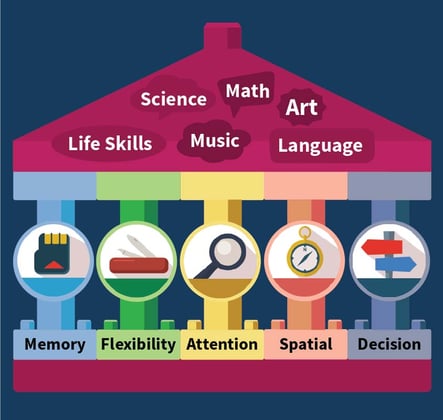The great writer Mark Twain said, “Wrinkles should merely indicate where smiles have been,” pertaining to people who are advancing in age.
While we worry about the challenges we face once we reach our senior years, our attitude towards this reality will also depend on whether it will be cumbersome, or something we will, and can, embrace.
Facing Cognitive Decline
One of the issues with aging is cognitive decline. Our life, and how we lead our life, is mostly dependent on how our brain is functioning. Cognitive functions are the ways in which our brain operates. From sensory perception, logic, and decision making, all the way to emotional or self regulation. Key cognitive functions needed would be the ability to think, learn, and remember. But an aging brain means slower processing speeds and less multi-tasking, although routine memory, skills, and knowledge may remain stable and even improve with age.
Once the symptoms of cognitive decline interfere with daily life, including disruptions in memory, attention, recognition (of people, places), solving routine problems, and making decisions, it may mean having early signs of dementia.
Alzheimer’s is the most common type of dementia, a disorder characterized by a decline in memory, thinking, and behavior skills which affects one’s ability to perform everyday activities. Alzheimer’s disease accounts for 60 to 80 percent of dementia cases.
There are more than 6 million people aged 65 and older who have Alzheimer’s disease in the United States, according to the Alzheimer’s Association. Signs to watch for include confusion with time or place, relying on others to remember things, difficulty completing familiar tasks, displacing things, decreased or poor judgment in making decisions, or personality and mood changes. In Alzheimer’s, the damage to the neurons may impair one’s ability to carry out basic bodily functions such as walking and swallowing. It can eventually lead to being bedridden, totally dependent on others for round-the-clock care, and yes, it can be fatal.
Every September, people come together from all around the world for World Alzheimer’s Month to raise awareness and to challenge the stigma that persists around dementia. September 2021 marks the 10th year of this vital global awareness raising campaign.
Maintain your brain health
Are there ways to maintain your brain health? Certainly. Maintaining a healthy lifestyle is one, including staying away from smoking or alcohol. Being physically active is helpful, as this helps in steadying your blood pressure, reduces anxiety, and depression. Good eating habits help one maintain a healthy weight and a stronger immune system. Getting enough sleep – at least 6-7 hours a night, can also help reduce cognitive decline.
Keeping a Healthy Brain with Neuroplasticity
While traditional ways to keep a healthy brain are very helpful, there are also other solutions to ensure that cognitive decline is well-managed, or at least, it does not get worse.
 Brain training for seniors is one of the complementary solutions to consider, which seeks to improve cognitive functions such as memory, decision making, attention, and spatial ability. Scientists agree that aside from a healthy diet and physical exercise, brain training has been found to be effective to improve brain health.
Brain training for seniors is one of the complementary solutions to consider, which seeks to improve cognitive functions such as memory, decision making, attention, and spatial ability. Scientists agree that aside from a healthy diet and physical exercise, brain training has been found to be effective to improve brain health.
Computer-based training improves memory and performance of everyday tasks in elderly people. This is due to the ability of our brains to change and restructure itself. It is called neuroplasticity.
Neuroplasticity enables our brain to reorganize itself, allowing the neurons in the brain to compensate for disease or injury and adjust to new situations or changes in the environment. In other words, our brain can adapt.
Although the reorganizing or “rewiring” of the brain sounds complicated, daily tasks done at home constitute neuroplasticity, where we can exercise our brain like a muscle, thereby pushing it to be stronger and healthier, like how we exercise our body to be physically healthy. Activities like learning a new language, making art, and learning to play a musical instrument, or perhaps just listening to music for music therapy, are good interventions for cognitive decline. Add to that regular exercise, travel, and playing video games help in strengthening our brain.
Computerized Cognitive Training (CCT) using NeeuroFIT
A clinical trial was conducted by the Geriatric Education and Research Institute, the Department of Geriatric Medicine at Khoo Teck Puat Hospital, and the Department of Psychological Medicine at Yong Loo Lin School of Medicine using NeeuroFIT, which explored how cognitive training can improve attention and executive functions. The objectives were to evaluate the implementation of community-based computerized cognitive training (CCT) and its effectiveness on cognition, gait, and balance in healthy older adults in Singapore. The CCT program resulted in cognitive improvements among healthy Singaporean older adults, with the study conducted in a real-world setting.
A total of 95 healthy adults aged 55 years and older in community centers participated in a 10-week CCT program with 2-hour instructor-led group classes twice a week. Participants used Neeuro's Memorie app to play games targeting attention, memory, decision making, spatial abilities, and cognitive flexibility. Implementation was assessed at the participant, provider, and community level (eg. reach, implementation, and facilitators, and barriers).
The clinical trial concluded that CCT can be implemented in community settings to improve attention and executive function among healthy older adults. Findings help to identify suitable healthy aging programs that can be implemented on a larger scale within communities.
Read more about the clinical trial in this article.
Optimize Brain Training with NeeuroFIT
NeeuroFIT for Seniors is a modular brain training program that enables participants to develop their cognitive functions using a structured curriculum, using fun and engaging games developed by neuroscientists. When a participant enrolls for NeeuroFIT, they not only get to play games and achieve good game scores, they will also be trained to hone specific cognitive skills through repetition and goal setting. NeeuroFIT is also paired with the Neeuro SenzeBand 2, using the Memorie application, that helps to provide essential EEG information and mental states during the training.
With NeeuroFIT, cognitive well-being is improved with gamification and EEG training, proving the effectiveness of brain training which has been advocated by decades of scientific research. With mobile applications and computer games easily available, NeeuroFIT is able to offer adaptive, handy, and powerful training programs for effective brain exercise for seniors, anytime, and anywhere.
“I have achieved my seventy years in the usual way: by sticking strictly to a scheme of life which would kill anybody else... I will offer here, as a sound maxim, this: That we can't reach old age by another man's road.” Mark Twain said this on his 70th birthday, being his usual humorous self, but at the same time being realistic. It is inevitable that we will reach our senior years, so it is vital that the road we thread is one that will entail good management of life, where we can gracefully age, wrinkles notwithstanding.
Increase your potential to perform better; train on your focus, logic, and other cognitive skills through proper brain health education and brain training games. Learn more with NeeuroFIT Brain Training Courses for seniors, as you set yourself, or your senior parents, to a stronger and healthier brain.






Leave a Comment